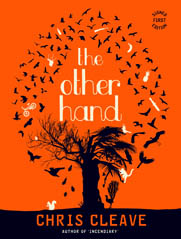“Most days I wish I was a British pound coin instead of an African girl,” opines the protagonist of T he Other Hand. The pound coin has many advantages, not least of which is its effortless mobility:
he Other Hand. The pound coin has many advantages, not least of which is its effortless mobility:
“A girl like me gets stopped at immigration, but a pound can leap the turnstiles, and dodge the tackles of those big men with their uniform caps, and jump straight into a waiting airport taxi. Where to, sir? Western civilisation, my good man, and make it snappy.”
Little Bee is a Nigerian girl fleeing men armed with machetes and men armed with official powers. Sarah is a suburban career woman juggling a young son who refuses to take off his Batman suit with an extramarital affair with a Home Office functionary, Lawrence. Their lives are thrown together in an unlikely way, forcing them to confront themselves and the society they live in.
Cleave skilfully alternates the narration between Little Bee and Sarah, and between Nigeria and Britain, emphasising how our stories are increasingly intertwined in the age of globalisation.
Recalling the experience of writing down her grounds for asylum application, Little Bee noted how her whole life had to be made to fit on a single sheet of paper:
“They only gave you enough space to write down the very saddest things that happened to you. That was the worst part. Because if you cannot read the beautiful things that have happened in someone’s life, why should you care about their sadness?”
One purpose of the Other Hand is to fill in those gaps in the tragic tale of a refugee’s life: the moments of hope and joy and the memories of childhood village life before the oil and blood began to flow. Little Bee’s character is redeemed from insufferable Pollyannaism by her sly sense of humour (“I have noticed, in your country, I can say anything so long as I say, That is the proverb in my country.”)
On his website the author explains that taking a temporary job in the canteen of a “concentration camp” – a removal centre for asylum seekers near Oxford – inspired him to write this book. A journalist himself, Cleave is concerned at media representations of people and events. Sarah struggles to retain “serious stories” as editor of a women’s lifestyle mag. And in a passage clearly referential to the demise of David Blunkett, a media scrum pursues the Home Secretary demanding details of his tawdry affair while the real scandals in the Home Office occur daily, and remain unreported.
The Other Hand suggests self-sacrifice by individuals in the imperialist countries may be required to assist the distressed of the Third World, and further to that, such acts may yet be inadequate. Something beyond Little Bee’s resourcefulness, Sarah’s good intentions and Lawrence’s turning a blind eye of officialdom is required. Perhaps it is hinted at in a fleeting scene on a commuter train where Sarah notices a young man seated opposite: “He wore an England shirt and blue jeans, white with plaster dust. Tattooed on the inside of his forearm, in a gothic typeface, were the words: THIS IS A TIME FOR HERO’S.”
Mike Kay
